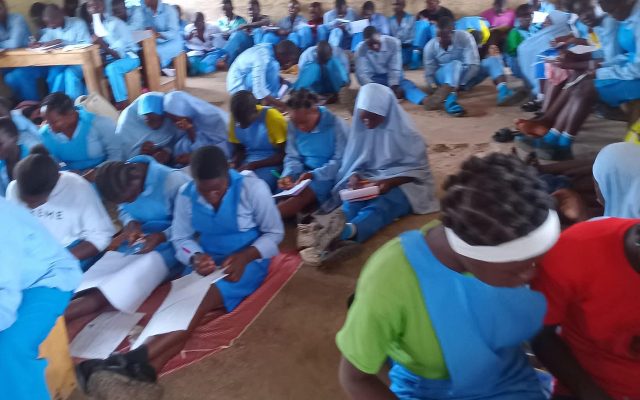The mid-day sun pours through broken windows into several classrooms where the floors have become both desks and chairs for students.Dozens of students, hunched over exercise books balanced on their knees, scribble answers as an examination unfolds.
For the boys and girls of Salihu Dogo Government Secondary School, and other public schools in Jalingo, the capital of Taraba State, this is not an isolated experience; it’s a daily life.
A recent visit by The Guardian to public schools in Jalingo revealed disturbing scenes that lay bare the stark realities of public education in the state.
In most of the schools visited, the classrooms are in despicable state with leaking roofs, cracked walls, while students study on bare floors. Basic necessities in the learning environment like desks and chairs are virtually non-existent but instead, students squat or sit on dusty concrete floors with their uniforms streaked with dirt.
“It’s very hard to write like this,” confessed one of the students, clutching her pen and exercise book tightly. “Our hands get tired quickly, and sometimes the dust makes us cough,” the student said.
“When the rain comes, water enters the class. We have to run and find somewhere else to stay. Sometimes, lessons stop completely,” another student said.
Some teachers in the government-owned schools visited in the Jalingo metropolis echoed the same frustration. Some of them, who spoke on condition of anonymity, lamented that lack of infrastructure is not only uncomfortable for students but also damaging their academic performance.
“How can a child concentrate on learning or do well in examinations when he has no table to write on?” the teacher asked. “We keep appealing to the government, but little is changing,” the teacher said.
The conditions at Salihu Dogo reflect a broader crisis in the public education sector across Taraba, where underfunding and neglect have left the schools in a state of disrepair.
According to education advocates, inadequate learning environment contributes significantly to poor performance in national examinations, increases dropout rates, and the widening gap between public and private education in the state.
Former Nigerian Envoy to the Republic of Trinidad and Tobago, Hassan Ardo Juka, said the much publicised free education programme is a mess, stating that “students have no uniforms, no sandals, sit on bare floors, and classrooms are overcrowded.”
“Nothing new has been started or completed. There are no new roads, no impactful projects, but just propaganda. Governor Kefas has lost the confidence of the people and has become a political liability,” Ardo said.
Wondering why schools in the state capital have continued to suffer neglect despite the free and compulsory education policy, Sanda Useni, a civil society activist, urged the governor to personally visit all the public schools in the state capital.
“If students can still be sitting on bare floors in classrooms in schools within the state capital, I wonder how our schools in the rural communities will look,” Useni said.
Useni was of the view that there are a few persons going about trying to frustrate the governor’s free education policy. He, therefore, urged the governor to put in place a monitoring team that would report happenings in schools directly to him.
Stella Manza, an education advocate, attributed the snail speed of the free and compulsory education policy to the alleged failure of the government to put in place monitoring mechanisms that will ensure its success in the nooks and crannies of the state.
However, for the students of Salihu Dogo and other public schools in the state capital, hope remains a fragile but stubborn spark. Despite the hardship, they continue to come to school every day, driven by dreams of becoming doctors, teachers, lawyers, and leaders. But the question lingers: how much longer can they be expected to write their futures from the floor?
Meanwhile, efforts made by The Guardian to reach out to the Commissioner for Basic Education, Dr Augustina Godwin, failed as she neither responded to telephone call nor WhatsApp message.







